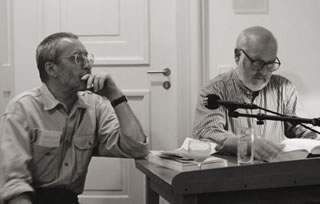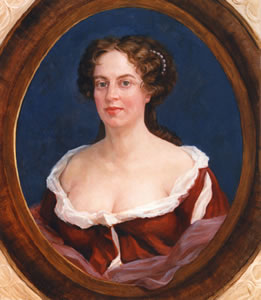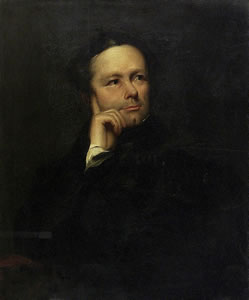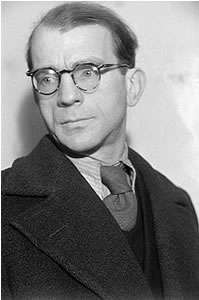De Duitse dichter en schrijver Paul Wühr werd geboren op 10 juli 1927 in München. Zie ook alle tags voor Paul Wühr op dit blog.
NICHT
einmal will ich dich anders
als du bist sagt sie ich
will so weit mit mir in dir
eine Andere sein bis
ich am anderen Ende von mir
du sein werde was wird
aus dir werden willst du so weit
mit mir in mir dieser
Andere sein bis du am anderen
Ende von dir ich sein wirst
WO
sag mir höre ich auf in Hinsicht
auf dich das Andere
zu sein bis zu dir bin ich
gegenüberin dir
bin ich ganz Mann als eine
ganze Frau stell
dir vor uns hat noch nichts
geschieden von einem
Ende zum anderen Ende werden
wir immer das Andere
werden von dem wir das Eine
gar nicht sein müssen
ich sagt sie mit mir anfange
würdest du
nicht etwa aufhören der Mann
zu sein wenn
du enden könntest in mir
immer mit
dir zusammen bist du am
Ende von dir
was ich von Anfang an bin

Hier met de literatuurwetenschapper Jörg Drews (links)
De Britse schrijfster Aphra Behn-Johnson werd geboren in Kent op 10 juli 1640. Zie ook alle tags voor Aphra Behn-Johnson op dit blog.
LOVE ARMED
Love in fantastic triumph sat,
Whilst bleeding hearts around him flowed,
For whom fresh pains he did create,
And strange tyrannic power he showed,
From thy bright eyes he took his fire,
Which round about, in sport he hurled;
But ‘twas from mine, he took desire,
Enough to undo the amorous world.
From me he took his sighs and tears,
From thee his pride and cruelty;
From me his languishments and fears,
And every killing dart from thee;
Thus thou and I, the god have armed,
And set him up a deity;
But my poor heart alone is harmed,
Whilst thine the victor is, and free.

Portret door Sarah Belchetz-Swenson (1994)
De Engelse schrijver en marineofficier Frederick Marryat werd geboren op 10 juli 1792 in Londen. Zie ook alle tags voor Frederick Marryat op dit blog.
Uit: The Naval Officer
„My father was a gentleman, and a man of considerable property. In my infancy and childhood I was weak and sickly, but the favourite of my parents beyond all my brothers and sisters, because they saw that my mind was far superior to my sickly frame, and feared they should never raise me to manhood; contrary, however, to their expectations, I surmounted all these untoward appearances, and attracted much notice from my liveliness, quickness of repartee, and impudence: qualities which have been of much use to me through life.
I can remember that I was both a coward and a boaster; but I have frequently remarked that the quality which we call cowardice in a child, is no more than implying a greater sense of danger, and consequently a superior intellect. We are all naturally cowards: education and observation teach us to discriminate between real and apparent danger; pride teaches the concealment of fear, and habit renders us indifferent to that from which we have often escaped with impunity. It is related of the Great Frederick that he misbehaved the first time he went into action; and it is certain that a novice in such a situation can no more command all his resources than a boy when first bound apprentice to a shoemaker can make a pair of shoes. We must learn our trade, whether it be to stand steady before the enemy, or to stitch a boot; practice alone can make a Hoby or a Wellington.
I pass on to my school-days, when the most lasting impressions are made. The foundation of my moral and religious instruction had been laid with care by my excellent parents; but, alas! from the time I quitted the paternal roof not one stone was added to the building, and even the traces of what existed were nearly obliterated by the deluge of vice which threatened soon to overwhelm me.“

Portret doorE. Dixon, 1830
De Duitse schrijver en dramaturg Günther Weisenborn werd geboren op 10 juli 1902 in Velbert. Zie ook alle tags voor Günther Weisenborn op dit blog.
Wer am Tisch sitzt und ißt,
hört schon vor der Tür
die Schritte derer,
die ihn hinaustragen werden.
Der die Lampe andreht, weiß,
seine Hand wird kalt
wie die Klinke sein,
eh der Nächste die Lampe ausdreht
Wer sich früh anzieht,
ahnt, daß er Ostern
mit diesem Anzug
unter der Wiese liegt.
Wer den Wein trinkt, weiß,
dieser Rausch wird
sein Hirn nicht mehr erreichen,
sondern auslaufen wie ein Ei.
Leicht ist der Schrei
der eiligen Schwalben.
Sie sind rasch , aber rascher
als sie ist das Ende.

